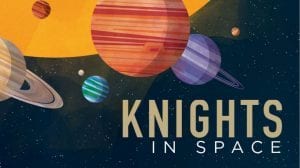Knights in Space
In the latest issue of UCF’s magazine, Pegasus, there are many stories focusing on UCF’s involvement with space. Many of these stories feature researchers from the UCF Physics Department.
In the page One Small Step for Man, One Giant Leap for UCF, a timeline traces UCF’s history with space. From Citronaut, UCF’s first mascot in 1968, to future space expeditions, UCF’s connections to space continue to grow.
UCF researchers have focused their attention beyond our Central Florida skies to investigate cosmic mysteries about nearly every planet in the solar system, plus a few other celestial objects. In the page Knights in Space, UCF researchers’ space involvement is mapped throughout the solar system and beyond. Several researchers from the UCF Physics Department are featured on this page.
In the page Knight View, UCF’s Robinson Observatory is highlighted. The facility, which houses a 20-inch telescope, offers students a training ground to collect solid data and conduct original research. The facility is directed by Yan Fernandez, associate professor of planetary science.
In the page Heavy Metal, a meteorite collection of UCF Physics professor Daniel Britt, Ph.D., is spotlighted. Dr. Britt began building a collection of meteorites in 2003 to help his students better comprehend the composition of asteroids, planets and other celestial bodies.
The page Go for Launch features UCF professor Joshua Colwell, Ph.D., and his team of physics faculty and students. The team’s experiment became the first to go to space aboard Blue Origin’s New Shepard in April, 2016. The project, known as MEDEA, examines how space dust builds up to form planets and the rings around planets.
With research expanding throughout our solar system and beyond, the human race is on the cusp of a new Space Age. The page Where to Next? features UCF scientists’ revelations on the future of space exploration.

